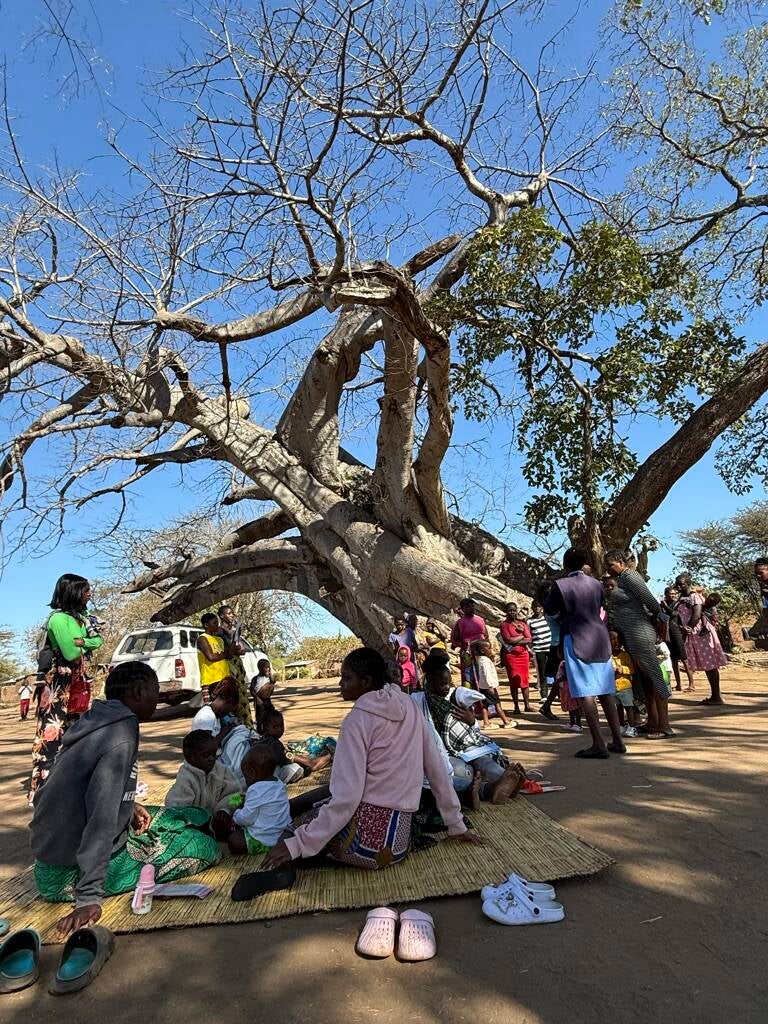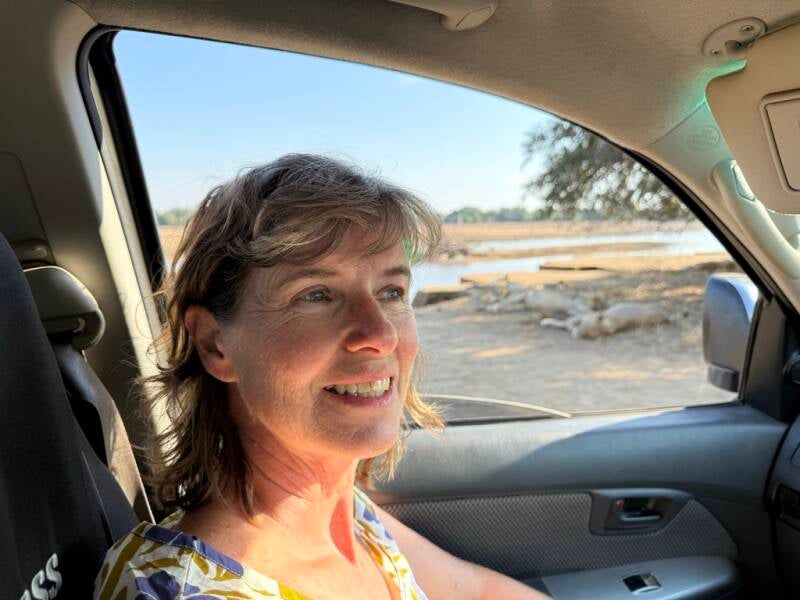
Photo of the week - we find Lucy out hunting
Highlight of the week: 500 recruits are now in our stroke prevention programme.
Lowlight of the week: A late night call saps our energy.
Minimum temperature: 11 degrees Celsius
Rainfall: Still waiting
Before you master the stethoscope, you’ve got to master the art of connecting with people. As a medical educator who's been around the block a few times, I’ve learned that the earlier you reach them, the better. Nowadays, as soon as the nappies come off, students get a diet of ICE. Ideas. Concerns. Expectations. We waxed lyrically about this in 2023. On graduation, the patter becomes refined. Forget it at your peril. Resurrect it to leap those little hurdles as you progress through your medical career. It’s a framework that keeps the chaos at bay. Omit it and you risk unhappy punters and confusion.
When a sick child is admitted, we carry the parents and the family with us. Inform. Be honest. Update. Avoid jargon. Sometimes be guarded. But always communicate. And check understanding. Students are taught to chunk and check. Break it down. Bit by bit. Medicine is complicated. Explaining illnesses and treatment is vital.
Zambia is rather behind the times. Communication the except. Not the rule. Involving patients in decision making, almost unheard of. We would like to buck that trend. Our efforts may seem token to some. This week Keith and I see William, a 67-year-old man. We have a room full. Family. Patient. Three clinicians. William’s problems need unpicking. He has been told that he has prostate cancer. Yet his prostate feels normal. His prostatic ultrasound is reassuring. Keith spends some time explaining his thoughts. The possible diagnoses. Chunk. And the possible ways forward. Chunk. Keith then checks. Do you have any questions? Silence. William slowly turns to the clinical officer and states: I don’t know what to ask. William has never been asked if he has any questions before. No-one has ever tried to explain his illness, or the possible investigations with him before. Let alone the possibility of him being able to share decisions about his own care. Dumbfounded, William smiles. He likes this approach, but William is not quite with the programme just yet. The family sigh with relief. They have been unhappy with clinician centred care that has given no clarity.
Our first week back in the clinic is heartening. Old friends greet us warmly. New colleagues look on with interest. I choose to spend my first morning in the clinic with Agatha. A new nurse. We aim to see paediatric patients. It’s winter here. I lose count of the number of children with viral colds and flu. Only one child today has malaria. Our needle in a haystack. Every child with a history of fever really needs a malaria test. A finger-prick blood test. If we are lucky, a result within 10 minutes. At the moment we are waiting 1-2 hours for those results. No rapid tests today. Just old-fashioned blood films. For staining. Examined meticulously under the microscope. We have to limit our tests. Hedge our bets. Our haystack is taking a while to process today. I pray for respite. Something to break the monotony. Answering my prayers: Keith comes to find me. Can you come and see a child? I’d like you to do a developmental assessment please. There is no need to ask me twice!
Peter is 11 years old. He is with Janita, his stepmother. Janita worries about him. He is not doing well at school. She would like to know why. I probe a little further. He only plays with younger children. Girls. He can be giggly. He often wets himself. Needs help on the toilet. He is in year one at school. He has been in year one for 3 years. His teachers say he’s not ready to progress. He is not learning well.
I put my paediatric hat well and truly on. I decide to start at the beginning. The pregnancy. His birth history. Janita looks at me blankly. He only came to live with us this year. I have been with his father for 6 years. He had a nasty divorce from his ex-wife. I didn’t know him then. I have no idea about his early life. But mum, Caral, will help.
Caral comes on the phone. She speaks fluent English. I explain who I am. I offer to help to find some answers. She appears to remember all the details. Peter was born on time. Normal pregnancy. No infections in pregnancy. No drugs or alcohol. Peter cried at birth. Fed well. Grew well. Walked and talked at the expected times. There were no issues. He changed when he was 8 years old. I’m puzzled. How odd! No further information is offered. No history of head injury. No accidents. Caral fails to mention his epilepsy and the new medicine that has stopped his unmentioned fits. The trail seems cold.
I scratch my head. What is going on? I decide to stop asking open questions. Perhaps a few closed, yes/no answers are needed? Has he ever had a severe infection? Like severe malaria or meningitis. Caral answers: Yes, immediately. He had severe malaria when he was 7. He had lots of convulsions. He was in hospital for a couple of weeks.
Eureka. Finally, a breakthrough. Of course, Zambian hospital care is nothing like we are used to in the UK. No large multidisciplinary teams. Peter was admitted with his malaria. And given treatment. But the condition was never explained to his parents. No assessments after he got better. No clinic follow up. No community support. He started to have fits shortly after this episode. But these were looked at and treated in isolation. The epilepsy team probably never even knew that he had had cerebral malaria. Notes rudimentary. Dots not joined. He was doing well at school until the age of 7. Then he dropped off a cliff. No educational assessments. No educational psychology. Peter’s teachers just reported a lack of progress.
This surely must be the smoking gun. I explain to Caral and Janita that I think Peter’s episode of cerebral malaria has damaged his brain. Janita phones Andrew, Peter’s dad. I share the situation with Andrew too.
My crystal ball comes out. In truth, I have no idea what Peter’s future holds. But I have no doubt that understanding why he is having difficulties will be really useful to the family. I reiterate the importance of continuing with his education. I ask them to seek out a special education needs teacher in the valley. I guess that someone in this special Valley has relevant skills. I urge Andrew not to punish Peter for his apparent failures. But to celebrate his successes. To concentrate on self-cares skills. Help him to find a hobby. Something he loves.
Peter may well find a manual skill at which he can excel. He is never going to be an A* academic pupil. But there is no reason why, with gentle support and directed input, he shouldn’t be able to live an independent life. Perhaps he might farm. Thrive. Be accepted. Embraced. Become part of a community that can make invisible disability able. Putting ability in capital letters and dissing the lower-case impairment.
I sum up my day with a high and with a low. With a rose and with a thorn. The contrast emphasising any victory and any setback. My thorn today, that Peter has been left not the full shilling. My rose today, that understanding Peter’s deficits will allow his parents to reset their expectations. Peter’s future is what it can be.

Webcam photo of the week - the reason we do not walk around Kapane at night

We are back into the tree clinics. Child health education in the bush

Lions after lunch


Before and after. 2023 and 2025. Remarkable healing from a nasty burn
Add comment
Comments
Brilliant as usual
Echo that last comment
Inspiring
Always makes me happy 😊
Really enjoying the blog, especially today with Peter and the aftermath of cerebral malaria. (Am sending you an email with news - not good) xxx
Shame about Peter but you did very well in investigating and establishing the root of the problem. Best wishes for the coming weeks x
Fabuloso!
That's some really good doctoring all around. I am so glad you have the time and interest to delve into the varied clinical and process problems, and break it down for people, and empower them, help them understand their past disease impacts. Bravo
Brilliant work guys
Let’s hope you get some chill out time shortly
Keep up the good work xx